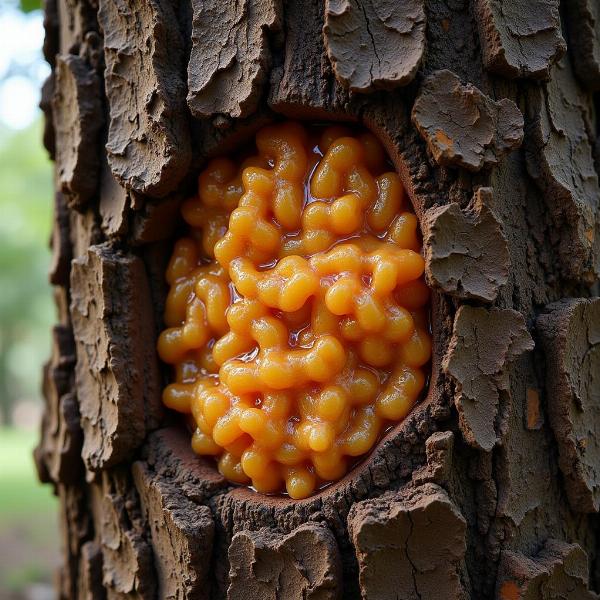Keekar meaning in Hindi refers to the Babool or Acacia tree, a significant plant deeply rooted in Indian culture, tradition, and daily life. This article explores the various facets of keekar, from its linguistic meaning and botanical properties to its cultural, medicinal, and economic importance. We will delve into the multifaceted world of this remarkable tree and understand why it holds such a prominent place in the Indian landscape.
Understanding the Term “Keekar”
The word “keekar” (कीकर) is the common Hindi name for several species of Acacia, most notably Acacia nilotica. While “babool” (बबूल) is another widely used term, “keekar” is particularly prevalent in certain regions of India. Both names point to the same thorny tree known for its resilience and diverse uses.
What does the word keekar actually signify? Beyond simply naming the tree, “keekar” carries connotations of hardiness, adaptability, and resourcefulness, reflecting the tree’s ability to thrive in harsh conditions. It’s often associated with rural landscapes and has become an integral part of the cultural fabric of many Indian communities.
Botanical Characteristics of Keekar
Keekar is a medium-sized, thorny tree with a spreading crown. Its bark is rough and dark brown, while the leaves are bipinnate and feathery. The tree produces small, fragrant yellow flowers arranged in spherical clusters. The fruit is a flat, curved pod containing several seeds. Keekar is remarkably drought-tolerant and can grow in a wide range of soil types, making it a common sight in arid and semi-arid regions of India.
The Resilience of Keekar in Diverse Environments
Keekar’s adaptability extends to various climatic conditions. It thrives in hot, dry climates and tolerates poor soil conditions. This resilience has contributed to its widespread distribution across India and other parts of the world.
Cultural Significance of Keekar
Keekar holds considerable cultural value in India. Its branches are often used in religious ceremonies and festivals. In some communities, the tree is considered sacred and is worshipped as a symbol of strength and longevity. Traditional folklore and songs often mention keekar, weaving it into the narrative of rural life.
Keekar in Traditional Practices and Beliefs
Keekar is an integral part of many traditional practices. Its wood, bark, leaves, and gum have been used for various purposes for centuries. The tree plays a significant role in traditional medicine, providing remedies for a wide range of ailments.
Medicinal and Economic Uses of Keekar
Keekar is a treasure trove of medicinal properties. Its bark is known for its astringent and antiseptic qualities, and is used in traditional remedies for skin infections and gum diseases. The gum, known as gum arabic, has various applications in the pharmaceutical and food industries. The tree’s wood is strong and durable, making it suitable for construction and furniture making. Keekar also plays a vital role in preventing soil erosion and desertification.
Keekar’s Contribution to Health and Livelihood
From providing shade in scorching summers to offering medicinal remedies and livelihood opportunities, keekar contributes significantly to the well-being of rural communities. Its economic value extends to various industries, demonstrating its versatility and usefulness.
 Keekar Tree Bark and Gum
Keekar Tree Bark and Gum
Conclusion: The Enduring Legacy of Keekar
Keekar, a simple yet profound symbol of resilience and resourcefulness, holds a special place in the Indian heartland. From its diverse uses to its cultural significance, keekar continues to enrich lives and shape traditions. Understanding the “keekar meaning in Hindi” unlocks a deeper appreciation for this extraordinary tree and its enduring legacy.
FAQ
- What is the other name for keekar? Babool is another common name for keekar.
- What are the uses of keekar? Keekar is used for medicinal purposes, construction, furniture making, and in the food and pharmaceutical industries.
- Is keekar a sacred tree? In some communities, keekar is considered sacred and worshipped.
- Where does keekar grow? Keekar grows in arid and semi-arid regions of India and other parts of the world.
- What is keekar gum called? Keekar gum is known as gum arabic.
- What are the medicinal properties of keekar? Keekar bark has astringent and antiseptic properties.
- Is keekar wood strong? Yes, keekar wood is strong and durable.
Related Articles
Meaning-Hindi.in is your premier destination for professional Hindi translation services. We specialize in a wide range of translation solutions, from business and legal documents to technical manuals and website localization. Our expert team ensures accurate and culturally sensitive translations for all your needs. Whether you need business and commercial document translation, certified and legal document translation, technical and user manual translation, website and localization translation, educational and academic document translation, fast translation, or specialized translation, Meaning-Hindi.in is here to assist you. Contact us today at [email protected] or call us at +91 11-4502-7584.